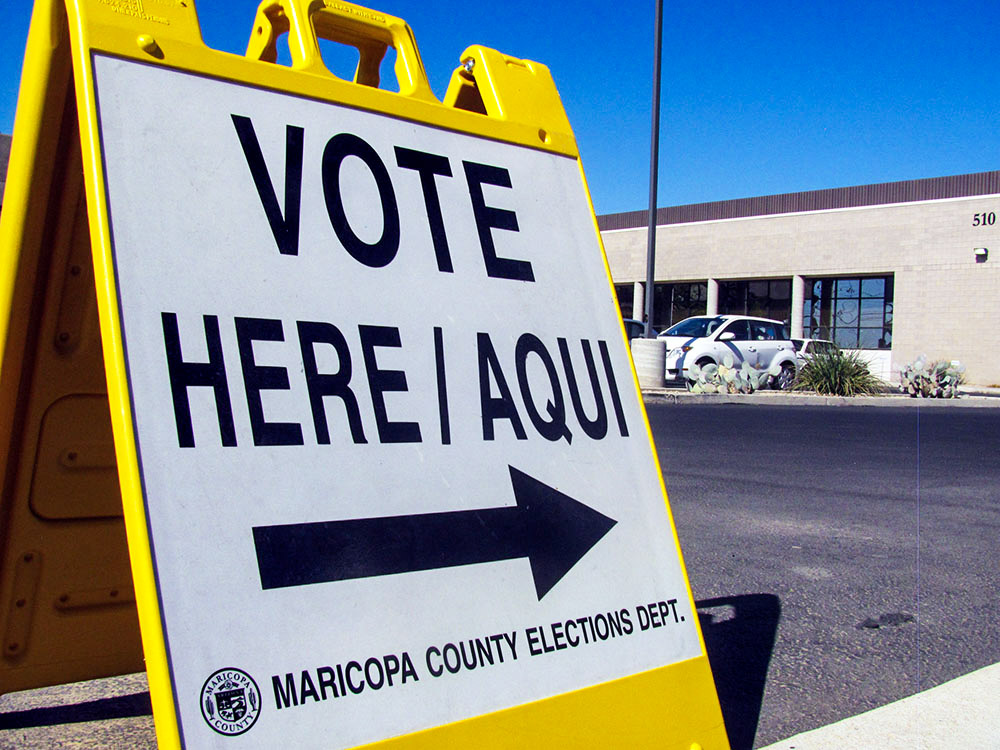Indianz.Com > News > Cronkite News: Pascua Yaqui Tribe denied early voting site

From showdown to stalemate, Pascua Yaqui voting site feud continues
Tuesday, September 22, 2020
Cronkite News
WASHINGTON – What was a showdown between the Pascua Yaqui Tribe, the Pima County Board of Supervisors and the county’s recorder has now turned into a stalemate.
The supervisors voted 3-2 Tuesday to authorize an emergency voting site to replace a polling place that the tribe has been trying to get restored for the last two years. While the board cannot order the site opened, Supervisor Betty Villegas said she hoped the resolution would pressure the recorder to “do the right thing.”
Pima Recorder F. Ann Rodriguez did not appear to feel the pressure.
In a brief letter Wednesday to Pascua Yaqui Tribal Chairman Peter Yucupicio, Rodriguez advised the tribe to contact the supervisors who voted for the resolution “to determine exactly how THEY plan on implementing THEIR resolution.”
Voting rights activist Alex Gulotta criticized the “unprofessional, almost childlike” tone of the letter.
“It’s just inappropriate for a governmental official to act to anyone that way,” said Gulotta, Arizona state director for All Voting is Local. “But let alone like, respond to an official correspondence from a sovereign nation with the kind of letter she responded with – it’s, it’s offensive.”
Join ACE, All Voting is Local and the Pascua Yaqui Tribal Council for an update on our victory this morning at the Pima Board of Supervisors on restoring early voting to this Tribal Community! Please share and email the Pima Recorder here to show your support: http://bit.ly/contactcountyrecorder
Posted by Arizona Center for Empowerment on Tuesday, September 15, 2020
Restoring early voting update
Posted by Pascua Yaqui Tribe of Arizona on Tuesday, September 1, 2020
Note: This story originally appeared on Cronkite News. It is published via a Creative Commons license. Cronkite News is produced by the Walter Cronkite School of Journalism and Mass Communication at Arizona State University.
Search
Filed Under
Tags
More Headlines
Press Release: National Museum of the American Indian hosts Native art market
AUDIO: Sea Lion Predation in the Pacific Northwest
Native America Calling: Tribal colleges see an uncertain federal funding road ahead
Native America Calling: Short films taking on big stories
Native America Calling: Advocates push back against new obstacles to Missing and Murdered Indigenous Relatives momentum
Native America Calling: For all its promise, AI is a potential threat to culture
NAFOA: 5 Things You Need to Know this Week (November 24, 2025)
Chuck Hoskin: Cherokee Nation invests in rural transportation
Native America Calling: Native candidates make strides in local elections
National Congress of American Indians returns incumbents and welcomes newcomers to leadership
National Congress of American Indians chooses leadership at big convention
‘Not voting is still a vote’: Native turnout drops amid changes in political winds
Native America Calling: Indigenous voices speak up, but have little clout at COP30
‘It’s bull****’: Indian Country confronts challenges at largest inter-tribal conference
Native America Calling: The constant burden on tribal hunters to justify their treaty rights
More Headlines
AUDIO: Sea Lion Predation in the Pacific Northwest
Native America Calling: Tribal colleges see an uncertain federal funding road ahead
Native America Calling: Short films taking on big stories
Native America Calling: Advocates push back against new obstacles to Missing and Murdered Indigenous Relatives momentum
Native America Calling: For all its promise, AI is a potential threat to culture
NAFOA: 5 Things You Need to Know this Week (November 24, 2025)
Chuck Hoskin: Cherokee Nation invests in rural transportation
Native America Calling: Native candidates make strides in local elections
National Congress of American Indians returns incumbents and welcomes newcomers to leadership
National Congress of American Indians chooses leadership at big convention
‘Not voting is still a vote’: Native turnout drops amid changes in political winds
Native America Calling: Indigenous voices speak up, but have little clout at COP30
‘It’s bull****’: Indian Country confronts challenges at largest inter-tribal conference
Native America Calling: The constant burden on tribal hunters to justify their treaty rights
More Headlines